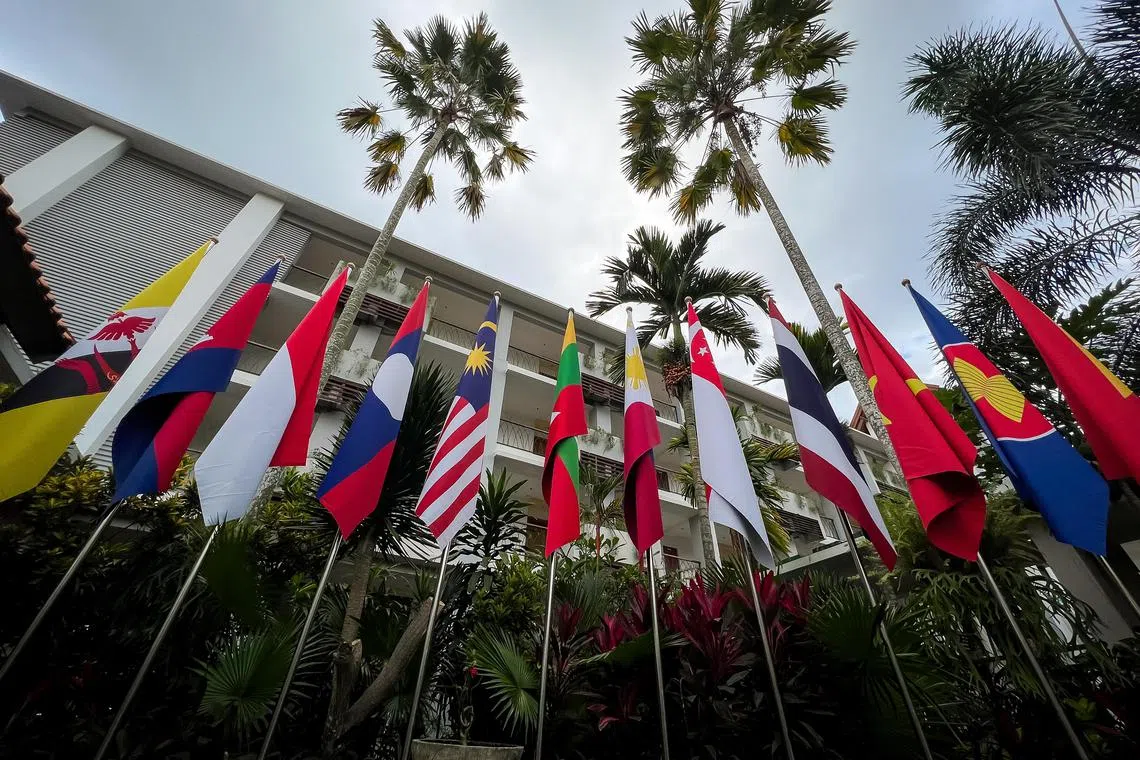Focus for Asean should be on implementing Myanmar peace plan: Experts
Sign up now: Get insights on Asia's fast-moving developments

The plan was drawn up to try to resolve the crisis triggered by the Myanmar military’s coup in February 2021.
ST PHOTO: GAVIN FOO
Follow topic:
LABUAN BAJO - Asean should focus on finding ways to implement the peace plan it has agreed on with Myanmar, instead of questioning its validity, said experts, adding that this was the more effective route towards ending the violence in the troubled nation.
The plan, called the five-point consensus (5PC),
But at the 42nd Asean Summit which ended on Thursday, its current chair, Indonesian President Joko Widodo, admitted that no significant progress had been made and called for unity in the bloc.
Observers said that several member states have recommended an easing of punitive actions aimed at Myanmar’s generals and letting more of its top diplomats attend the summit. Only non-political representatives were invited to some of these meetings over the past two years.
“The challenge is not abandoning or replacing the 5PC, it’s producing a workable implementing framework for the 5PC alongside all Myanmar stakeholders, and to ensure that Asean’s approach does not change depending on who the chair is in any given year,” Dr Evan Laksmana, a senior fellow for South-east Asia Military Modernisation from the think-tank IISS-Asia, told The Straits Times on Friday.
The peace plan calls for a dialogue between all parties, an immediate halt to violence, the appointment of an Asean special envoy to facilitate mediation, humanitarian assistance, and a visit by an Asean delegation to Myanmar to meet all concerned parties.
At the close of this week’s summit, Mr Widodo had strong words for those who criticised the bloc’s approach to Myanmar, and said engagement with the country has been ongoing.
Indonesia last week said that it had organised over 60 engagements
While this effort is commendable, the question remains as to the purpose of more engagements with more stakeholders as they have yet to produce concrete results, with the violence continuing, said Dr Lina Alexandra, head of the international relations department at the Centre for Strategic and International Studies.
Questions about the validity of the 5PC are “ineffective” as the plan has yet to be given the chance to even be tested, she said, adding that Indonesia actually has an opportunity to “demonstrate leadership” in putting it into action.
“Time is ticking, and Indonesia’s chairmanship will be over in six months, but the Myanmar crisis will not be solved by then. If Indonesia can lead Asean to issue the implementation plan that consists of practical, concrete and measurable steps for 5PC, it can show its strong leadership in the region,” she said.
Ms Joanne Lin from the ISEAS-Yusof Ishak Institute said that there is a sense of disappointment within the bloc over the lack of progress on Myanmar.
She highlighted how the need for an implementation plan of the 5PC was clearly stated by leaders last November after a review, but no timeline or specific steps forward have since been established.
“I think the region needs to see that Asean is doing something beyond just delivering humanitarian assistance, although it is understood that any durable solution will require endorsement from within (Myanmar),” she said.
“A simple report from the chair, showing engagements with the stakeholders of Myanmar or the international community in regard to this issue, would have been the very least that Indonesia can do to show the region its efforts.”
This is especially important given how the 5PC has exposed Asean disunity,
“Mr Widodo’s call to stress Asean unity implies that in the discussions during the summit, and likely in meetings preceding it, not all members are in full consensus on the steps taken to fully implement the 5PC as a whole,” said Dr Laksmana.
“Likely points of disagreement could include whether the ‘dis-invitation’ of Myanmar leaders to the foreign ministerial and summit leaders meetings should be extended to the wider set of Asean sectoral meetings as well.”
Still, Mr Widodo’s statement at the close of the summit did indicate that Asean leaders had reiterated their unified position on the 5PC remaining the bloc’s main point of reference.
While the Myanmar issue has dented Asean’s credibility, that does not mean that it has rendered the bloc irrelevant or ineffective, said Dr Mustafa Izzuddin, a senior international affairs analyst at Solaris Strategies Singapore.
Dr Mustafa, who is also a visiting professor of international relations at the Islamic University of Indonesia, added that the grouping deserves some commendation for how it has worked within “narrow regional confines”.
A dedicated regional strategy is what will eventually resolve the Myanmar conflict, he said.
“To find an answer to the Myanmar conundrum, it would require both Asean centrality and unity in fashioning out a fresher and sterner approach coupled with robust peer-pressure diplomacy which can provide more bite than bark for effective conflict resolution in Myanmar.”


